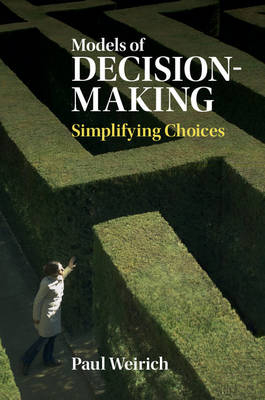
Models of Decision-Making
Simplifying Choices
Seiten
2015
Cambridge University Press (Verlag)
978-1-107-07779-9 (ISBN)
Cambridge University Press (Verlag)
978-1-107-07779-9 (ISBN)
Classical decision theory evaluates entire worlds, specified so as to include everything a decision-maker cares about. Paul Weirich argues that we need only compare small parts of the options we face in order to make a rational decision, and explains how we can simplify and streamline our choices.
Classical decision theory evaluates entire worlds, specified so as to include everything a decision-maker cares about. Thus applying decision theory requires performing computations far beyond an ordinary decision-maker's ability. In this book Paul Weirich explains how individuals can simplify and streamline their choices. He shows how different 'parts' of options (intrinsic, temporal, spatiotemporal, causal) are separable, so that we can know what difference one part makes to the value of an option, regardless of what happens in the other parts. He suggests that the primary value of options is found in basic intrinsic attitudes towards outcomes: desires, aversions, or indifferences. And using these two facts he argues that we need only compare small parts of the options we face in order to make a rational decision. This important book will interest readers in decision theory, economics, and the behavioral sciences.
Classical decision theory evaluates entire worlds, specified so as to include everything a decision-maker cares about. Thus applying decision theory requires performing computations far beyond an ordinary decision-maker's ability. In this book Paul Weirich explains how individuals can simplify and streamline their choices. He shows how different 'parts' of options (intrinsic, temporal, spatiotemporal, causal) are separable, so that we can know what difference one part makes to the value of an option, regardless of what happens in the other parts. He suggests that the primary value of options is found in basic intrinsic attitudes towards outcomes: desires, aversions, or indifferences. And using these two facts he argues that we need only compare small parts of the options we face in order to make a rational decision. This important book will interest readers in decision theory, economics, and the behavioral sciences.
Paul Weirich is a Curators' Professor in the Department of Philosophy at the University of Missouri. His previous books include Collective Rationality (2010), Realistic Decision Theory (2004), Decision Space (Cambridge, 2001) and Equilibrium and Rationality (Cambridge, 1998).
Preface; Introduction; 1. Separability; 2. Expected utility; 3. Intrinsic utility; 4. Temporal utility; 5. Spatiotemporal utility; 6. Causal utility; Conclusion.
| Erscheint lt. Verlag | 5.2.2015 |
|---|---|
| Zusatzinfo | 7 Tables, black and white; 15 Line drawings, black and white |
| Verlagsort | Cambridge |
| Sprache | englisch |
| Maße | 160 x 236 mm |
| Gewicht | 540 g |
| Themenwelt | Geisteswissenschaften ► Philosophie |
| Mathematik / Informatik ► Mathematik ► Angewandte Mathematik | |
| Mathematik / Informatik ► Mathematik ► Finanz- / Wirtschaftsmathematik | |
| Naturwissenschaften | |
| Wirtschaft ► Allgemeines / Lexika | |
| Wirtschaft ► Betriebswirtschaft / Management ► Allgemeines / Lexika | |
| Wirtschaft ► Volkswirtschaftslehre | |
| ISBN-10 | 1-107-07779-6 / 1107077796 |
| ISBN-13 | 978-1-107-07779-9 / 9781107077799 |
| Zustand | Neuware |
| Haben Sie eine Frage zum Produkt? |
Mehr entdecken
aus dem Bereich
aus dem Bereich
Buch | Softcover (2024)
Springer Vieweg (Verlag)
CHF 62,95
Anwendungen und Theorie von Funktionen, Distributionen und Tensoren
Buch | Softcover (2023)
De Gruyter Oldenbourg (Verlag)
CHF 97,90


